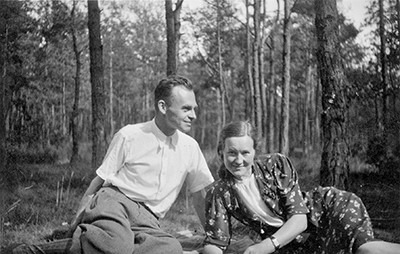Books
Feature
The Man Who Willingly Went to Auschwitz in ‘The Volunteer’

By Jack Fairweather (Custom House, 505 pp. $28.99)
Journalist and author Jack Fairweather has written a riveting account of Witold Pilecki, a Polish cavalry officer and underground resistance leader who fought the Germans after they invaded Poland in 1939. Relatively unknown in most histories of the Holocaust, in September 1940, Pilecki allowed himself to be captured by the Germans, gambling that he would be sent to Auschwitz, as had other Polish captives. Nazi Germany’s policy toward Poland was to eliminate the elite and use other Poles for slave labor. The 39-year-old Pilecki saw it as his patriotic duty to witness from within the atrocities directed toward his compatriots and also to organize a resistance army within the camp to sabotage its facilities. From October 1940 to March 1941, Pilecki’s report was smuggled by the Polish resistance to the British government in London. His report was also broadcast using a radio transmitter inside the camp. It included details on the number of arrivals and deaths and the condition of inmates. “Witold’s Report” (now available at witoldsreport.blogspot.com) was the first comprehensive account of the Holocaust from an eyewitness.
Pilecki spent more than two and a half years in Auschwitz and saw its evolution from a forced labor camp to the construction of the nearby Birkenau death camp. During his captivity, Pilecki also came to understand that Auschwitz was the center of the Nazi plans to annihilate the Jews of Europe. He felt it was a moral duty to warn the West of the impending destruction of the Jewish people. Once this was accomplished, Pilecki soon decided that he, too, needed to escape from Auschwitz to make his account more believable.
In April 1943, he fled the camp and delivered direct information on the Nazi plans to exterminate the Jews to the Polish underground in Warsaw, where it was subsequently sent to the Polish government in exile in London. Therefore, the Allies knew about the Final Solution as early as 1943 but, as Fairweather informs us, “The British and Americans had no interest in further debate about the mass murders or in supporting rescue measures that might divert resources away from the war effort.”

In 1940, when Pilecki had his couriers urge the Polish government in exile to bomb Auschwitz, the idea was overruled by Great Britain. In the end, Winston Churchill and others reinforced previous arguments that defeating the Germans was the best way to save what was left of European Jewry.
Having earlier rejected the proposal to bomb Auschwitz as too difficult and costly, the Allies found that some Jewish groups wanted to enlist the Polish underground to attack the camp—a strategy that Pilecki had been advocating. American officials, however, judged the Poles too lacking in strength to mount an offensive, despite Polish pilots having been instrumental in defeating the Germans in the air war over Great Britain in 1940.
At the conclusion of the war, Pilecki joined in the resistance to the Soviet “liberators” and fought for his country’s independence. He was arrested by the Communist regime in Poland and executed in 1948 at age 47.
Fairweather’s history is equally informative and engrossing.
Jack Fischel is the author of The Holocaust and the Historical Dictionary of the Holocaust.










 Facebook
Facebook Instagram
Instagram Twitter
Twitter
Leave a Reply